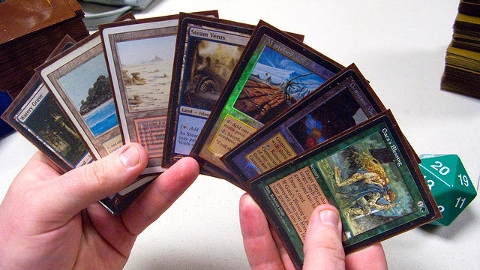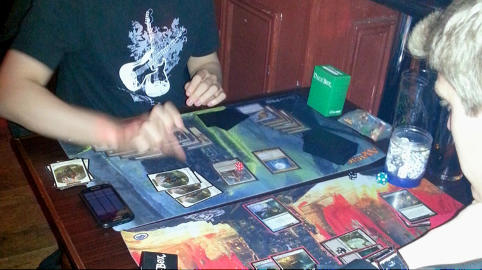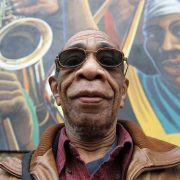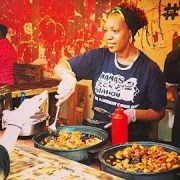
On Friday nights fans meet in to play ‘Magic: The Gathering’, the most successful Collectible Card Game. Photo: Terry Robinson
It is Friday evening in a pub in Croydon town centre. Music blares from speakers and mirrored balls rotate green and red laser pinpoints around the half full room. Either side of a long table a dozen or so young men, and one woman, shuffle intently through hands of cards. More players occupy smaller tables around them. They alternate between the intent concentration and animated conversation of card players in pubs throughout history, but this is not cribbage. Jumbled piles of jewel coloured packets like discarded sweet wrappers are scattered around pints of beer. They talk about ‘graveyards’ and ‘libraries’ and utter exotic phrases like: ‘Rise of the Eldrazi,’ or ‘Return to Ravnika’.
Adam Jenkins, 25, is the store manager at Forbidden Planet in Croydon and organised tonight’s get together. “I didn’t play before I started organising these nights.” he says, then laughingly tells me, “Financially it is the worst decision I’ve ever made, it is like cardboard crack.”
Adam’s addictive game is ‘Magic: The Gathering‘. On Friday nights legions of fans meet in bars, comic stores and bookshops all around the world, to socialise, trade cards and swap tactics. But most importantly they meet to play the original and most successful ‘Collectible Card Game’ (CCG) ever.
It began in 1993 as the creation of doctoral student and mathematician Richard Garfield, who was employed by game designers ‘Wizards of the Coast.’ He designed a game in which players ‘fight’ with a deck of tradeable cards featuring the creatures, spells and lands of a fantastic realm. Much like role playing games such as Dungeons and Dragons, players take turns to tackle each other and defend themselves with cards representing different creatures and enchantments. The cards are bought in specialist shops like Forbidden Planet and come in random packs. Players don’t know what they’ve got until they open the pack, when they might find that one of the cards packs a particular magical punch, the rarity of these powerful cards quickly translates into financial value as players scramble to get their hands on them. Gaming is made more creative by rules which limit the number of rare cards allowed in a game.
Now owned by Hasbro, ‘Wizards of the Coast’ claim over 12 million people play. They have built a highly successful business model around it. I am here to find out what makes it so popular.
There is a strong social element to Magic’s success as evidenced by Adam’s Friday events. He says: “I enjoy it. I’d go as far as saying it is a huge part of my life. Some of the people that I play have become friends. I’ve hired people from the group because I’ve seen their commitment to the community.”
The game provides people with a reason to gather, to meet people. “I used to be incredibly shy.” Lorraine Scott-Drysdale, 24, a waitress and the lone female player tells me. “My boyfriend got me into Magic. Coming here and playing this has made me confident and sociable.”
At a quiet table I chat to Terry and Sam, two newbies watching a serious game between experienced players. Terry tells me about the online version which he ‘hates’: “I want to see my opponent” he says. In a world where the word ‘viral’ is associated with social media and online platforms, ‘Magic’ stands out. Its ability to spread comes from the physicality of the original game – people need other people to play with, to place their cards in front of. Everyone I spoke to at the event had started at the request of a friend or partner who wanted someone to practice with.

The game was created in 1993 by Richard Garfield, a doctoral student and mathematician. Photo: Laura Woodrofe
All the players have boxes of cards peeking out of their bags. “Some people are collectors” Josh Buchan, a 24 year old Electro-medical Engineer from Waddington tells me. Collectibility is the second ingredient to Magic’s success. “The deck I’m playing with tonight is worth about £400” Josh says. He tells me about a rare card that recently sold for $27,000. Whether a completist collector or a rarity hunter, Magic provides an accessible way to channel the magpie urge.
There’s also a deeper reason for the seductiveness of the cards, as Adam explains. “It’s a really well thought out game. Each block of cards is a story with antagonists and protagonists. Some people are really into that.” Josh started playing when he was a teenager partly attracted by this storytelling element. He talks to me about the current block ‘Theros’, based on Greek Mythology. “There are humans devoted to their Gods and big, scary monsters. The set before Theros was about different Guilds within a city.” Wizards of the Coast bring out a new block every year so the story of ‘Magic’ keeps on building.
The game is learned quickly, I started to get the idea after a couple of hours of watching. But it is also intensely competitive and punches aren’t pulled for beginners. It can take a considerable investment of time and money to develop enough to challenge ‘pro’ players. “I was being destroyed for nine months before I started winning. It is a trial of fire” says Adam. “But all the time I was watching and listening and working out why I had lost.”
The format played at Tournaments cleverly requires players to buy new blocks released each year for their deck. The combination of luck, the ability to ‘buy’ a better deck and the strategic element mean that most players can progress their level of expertise, without ever reaching an endpoint. And this is where Magic becomes controversial and is sometimes compared to gambling. “I’m in this place now”, says Adam “where I’m wondering when I’m going to stop, how long am I going to be here playing this game?” Even the act of buying a booster pack for an innocent £3 is akin to buying a scratchcard as Josh explains: “Sometimes you open a pack and there’ll be a card in there worth £30, sometimes there’ll be nothing of any value. So it is a gamble in that sense.”
A quick search online reveals a few posts to forums from people worried about excessive playing. But because the game can only be experienced at it is best in a physical environment there are limits to playing it. It is harder to be consumed by it, as one can by online gambling and gaming. No-one at the meet-up was sleepwalking into financial ruin, in fact they all knew with a surprising exactness how much they had spent on it in the last six months.
Perhaps because Magic is an innately thoughtful activity, players are very aware of the nature of their relationship with it, and less likely to lose themselves in it.
Anyone interested in attending a Magic event in Croydon should get in touch via the Facebook page.




